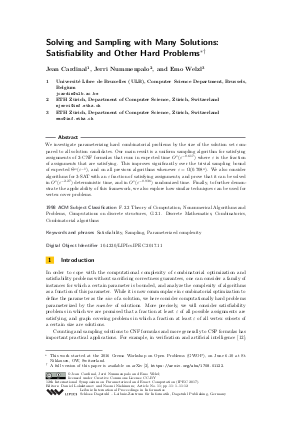Solving and Sampling with Many Solutions: Satisfiability and Other Hard Problems
Authors Jean Cardinal, Jerri Nummenpalo, Emo Welzl
-
Part of:
Volume:
12th International Symposium on Parameterized and Exact Computation (IPEC 2017)
Part of: Series: Leibniz International Proceedings in Informatics (LIPIcs)
Part of: Conference: International Symposium on Parameterized and Exact Computation (IPEC) - License:
 Creative Commons Attribution 3.0 Unported license
Creative Commons Attribution 3.0 Unported license
- Publication Date: 2018-03-02
File

PDF
LIPIcs.IPEC.2017.11.pdf
- Filesize: 0.52 MB
- 12 pages
Document Identifiers
Subject Classification
Keywords
- Satisfiability
- Sampling
- Parameterized complexity
Metrics
- Access Statistics
-
Total Accesses (updated on a weekly basis)
0PDF Downloads0Metadata Views
Abstract
We investigate parameterizing hard combinatorial problems by the size of the solution set compared to all solution candidates. Our main result is a uniform sampling algorithm for satisfying assignments of 2-CNF formulas that runs in expected time O^*(eps^{-0.617}) where eps is the fraction of assignments that are satisfying. This improves significantly over the trivial sampling bound of expected Theta^*(eps^{-1}), and on all previous algorithms whenever eps = Omega(0.708^n). We also consider algorithms for 3-SAT with an eps fraction of satisfying assignments, and prove that it can be solved in O^*(eps^{-2.27}) deterministic time, and in O^*(eps^{-0.936}) randomized time. Finally, to further demonstrate the applicability of this framework, we also explore how similar techniques can be used for vertex cover problems.
Cite As Get BibTex
Jean Cardinal, Jerri Nummenpalo, and Emo Welzl. Solving and Sampling with Many Solutions: Satisfiability and Other Hard Problems. In 12th International Symposium on Parameterized and Exact Computation (IPEC 2017). Leibniz International Proceedings in Informatics (LIPIcs), Volume 89, pp. 11:1-11:12, Schloss Dagstuhl – Leibniz-Zentrum für Informatik (2018)
https://doi.org/10.4230/LIPIcs.IPEC.2017.11
BibTex
@InProceedings{cardinal_et_al:LIPIcs.IPEC.2017.11,
author = {Cardinal, Jean and Nummenpalo, Jerri and Welzl, Emo},
title = {{Solving and Sampling with Many Solutions: Satisfiability and Other Hard Problems}},
booktitle = {12th International Symposium on Parameterized and Exact Computation (IPEC 2017)},
pages = {11:1--11:12},
series = {Leibniz International Proceedings in Informatics (LIPIcs)},
ISBN = {978-3-95977-051-4},
ISSN = {1868-8969},
year = {2018},
volume = {89},
editor = {Lokshtanov, Daniel and Nishimura, Naomi},
publisher = {Schloss Dagstuhl -- Leibniz-Zentrum f{\"u}r Informatik},
address = {Dagstuhl, Germany},
URL = {https://drops.dagstuhl.de/entities/document/10.4230/LIPIcs.IPEC.2017.11},
URN = {urn:nbn:de:0030-drops-85459},
doi = {10.4230/LIPIcs.IPEC.2017.11},
annote = {Keywords: Satisfiability, Sampling, Parameterized complexity}
}
Author Details
References
-
Bengt Aspvall, Michael F Plass, and Robert Endre Tarjan. A linear-time algorithm for testing the truth of certain quantified boolean formulas. Information Processing Letters, 8(3):121-123, 1979.

- Jean Cardinal, Jerri Nummenpalo, and Emo Welzl. Solving and Sampling with Many Solutions: Satisfiability and Other Hard Problems. ArXiv e-prints, 2017. URL: http://arxiv.org/abs/1708.01122.
-
Anindya De, Omid Etesami, Luca Trevisan, and Madhur Tulsiani. Improved pseudorandom generators for depth 2 circuits. In Approximation, Randomization, and Combinatorial Optimization. Algorithms and Techniques, 13th International Workshop, APPROX, and 14th International Workshop, RANDOM, pages 504-517, 2010.

-
Peter Frankl and Zoltán Füredi. A short proof for a theorem of Harper about hamming-spheres. Discrete Mathematics, 34(3):311-313, 1981.

-
Timon Hertli. 3-SAT faster and simpler - unique-SAT bounds for PPSZ hold in general. SIAM Journal on Computing, 43(2):718-729, 2014.

-
Edward A Hirsch. A fast deterministic algorithm for formulas that have many satisfying assignments. Logic Journal of IGPL, 6(1):59-71, 1998.

-
Mark R Jerrum. Counting, sampling and integrating: algorithms and complexity. Springer Science &Business Media, 2003.

-
Mark R Jerrum, Leslie G Valiant, and Vijay V Vazirani. Random generation of combinatorial structures from a uniform distribution. Theoretical Computer Science, 43:169-188, 1986.

-
Daniel M Kane and Osamu Watanabe. A short implicant of cnfs with relatively many satisfying assignments. In Electronic Colloquium on Computational Complexity (ECCC), volume 20, page 176, 2013.

-
Kuldeep S Meel, Moshe Y Vardi, Supratik Chakraborty, Daniel J Fremont, Sanjit A Seshia, Dror Fried, Alexander Ivrii, and Sharad Malik. Constrained sampling and counting: Universal hashing meets sat solving. In AAAI Workshop: Beyond NP, 2016.

-
Burkhard Monien and Ewald Speckenmeyer. Solving satisfiability in less than 2ⁿ steps. Discrete Applied Mathematics, 10(3):287-295, 1985.

-
Yehuda Naveh, Michal Rimon, Itai Jaeger, Yoav Katz, Michael Vinov, Eitan s Marcu, and Gil Shurek. Constraint-based random stimuli generation for hardware verification. AI magazine, 28(3):13, 2007.

-
Tian Sang, Paul Beame, and Henry A Kautz. Performing bayesian inference by weighted model counting. In AAAI, volume 5, pages 475-481, 2005.

-
Manuel Schmitt and Rolf Wanka. Exploiting independent subformulas: A faster approximation scheme for #k-SAT. Information Processing Letters, 113(9):337-344, 2013.

-
Uwe Schöning. A probabilistic algorithm for k-SAT based on limited local search and restart. Algorithmica, 32(4):615-623, 2002.

-
Rocco Servedio and Li-Yang Tan. Deterministic search for CNF satisfying assignments in almost polynomial time. Unpublished manuscript, 2016.

-
Luca Trevisan. A note on approximate counting for k-DNF. In Approximation, Randomization, and Combinatorial Optimization. Algorithms and Techniques, pages 417-425. Springer, 2004.

-
Magnus Wahlström. A tighter bound for counting max-weight solutions to 2SAT instances. In International Workshop on Parameterized and Exact Computation, pages 202-213. Springer, 2008.

